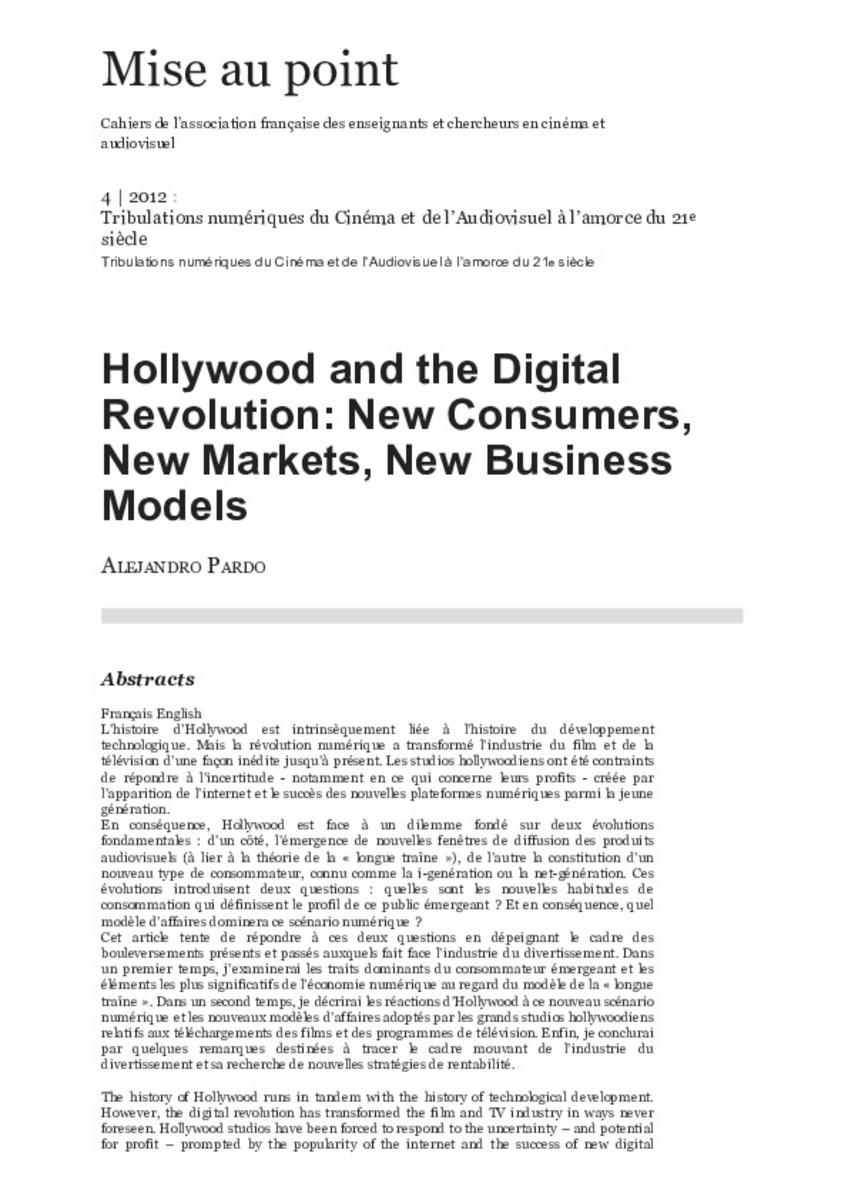Full metadata record
| DC Field | Value | Language |
|---|---|---|
| dc.creator | Pardo, A. (Alejandro) | - |
| dc.date.accessioned | 2014-08-21T10:43:16Z | - |
| dc.date.available | 2014-08-21T10:43:16Z | - |
| dc.date.issued | 2012 | - |
| dc.identifier.citation | Pardo, A., ""Hollywood and the Digital Revolution: New Consumers, New Markets, New Business Models"", en Tribulations numériques du Cinéma et de l’Audiovisuel à l’amorce du 21e siècle, monográfico de Mise Au Point, Cahiers de l’Association Française des Enseignants Chercheurs en Cinéma et Audiovisuel (AFECCAV) [on line], nº 4, 2012. | es_ES |
| dc.identifier.issn | 2261-9623 | - |
| dc.identifier.uri | https://hdl.handle.net/10171/36339 | - |
| dc.description.abstract | The history of Hollywood runs in tandem with the history of technological development. However, the digital revolution has transformed the film and TV industry in ways never foreseen. Hollywood studios have been forced to respond to the uncertainty – and potential for profit – prompted by the popularity of the internet and the success of new digital  1 platforms, especially among young people. Thus, Hollywood is standing at a new crossroads, charted by two basic movements: on the one hand, the emergence of new windows for the exploitation of audiovisual products (linked to “long tail” markets; on the other, the consolidation of new type of consumer, known collectively as the i-generation or net-generation. The two related questions in this regard are: What new consumer habits define this emerging viewer/audience profile? As a consequence, what business model will rule this new digital scenario? This article tries to respond to both questions, tracing the framework of present and future challenges facing the entertainment industry. First, I will examine the defining features of the emerging consumer profile and address the most significant elements of the new digital economy, epitomized by the ‘long tail market’ model. Secondly, I will describe the Hollywood reaction to this new digital scenario and discuss the business models adopted by major American studios in relation to the downloading of films and TV programs. Finally, I will make some concluding remarks to reframe the changing face of the entertainment industry and the search for the right business strategies. | es_ES |
| dc.description.abstract | L’histoire d’Hollywood est intrinsèquement liée à l’histoire du développement technologique. Mais la révolution numérique a transformé l’industrie du film et de la télévision d’une façon inédite jusqu’à présent. Les studios hollywoodiens ont été contraints de répondre à l’incertitude - notamment en ce qui concerne leurs profits - créée par l’apparition de l’internet et le succès des nouvelles plateformes numériques parmi la jeune génération. En conséquence, Hollywood est face à un dilemme fondé sur deux évolutions fondamentales : d’un côté, l’émergence de nouvelles fenêtres de diffusion des produits audiovisuels (à lier à la théorie de la « longue traîne »), de l’autre la constitution d’un nouveau type de consommateur, connu comme la i-genération ou la net-génération. Ces évolutions introduisent deux questions : quelles sont les nouvelles habitudes de consommation qui définissent le profil de ce public émergeant ? Et en conséquence, quel modèle d’affaires dominera ce scénario numérique ? Cet article tente de répondre à ces deux questions en dépeignant le cadre des bouleversements présents et passés auxquels fait face l’industrie du divertissement. Dans un premier temps, j’examinerai les traits dominants du consommateur émergeant et les éléments les plus significatifs de l’économie numérique au regard du modèle de la « longue traîne ». Dans un second temps, je décrirai les réactions d’Hollywood à ce nouveau scénario numérique et les nouveaux modèles d’affaires adoptés par les grands studios hollywoodiens relatifs aux téléchargements des films et des programmes de télévision. Enfin, je conclurai par quelques remarques destinées à tracer le cadre mouvant de l’industrie du divertissement et sa recherche de nouvelles stratégies de rentabilité. | es_ES |
| dc.language.iso | eng | es_ES |
| dc.publisher | Cahiers de l’Association Française des Enseignants Chercheurs en Cinéma et Audiovisuel (AFECCAV) | es_ES |
| dc.rights | info:eu-repo/semantics/openAccess | es_ES |
| dc.subject | Business models | es_ES |
| dc.subject | Hollywood | es_ES |
| dc.subject | Long Tail Theory | es_ES |
| dc.subject | Online distribution | es_ES |
| dc.title | Hollywood and the Digital Revolution: New Consumers, New Markets, New Business Models | es_ES |
| dc.type | info:eu-repo/semantics/bookPart | es_ES |
| dc.relation.publisherversion | http://map.revues.org/246 | es_ES |
Files in This Item:
Statistics and impact
Items in Dadun are protected by copyright, with all rights reserved, unless otherwise indicated.






